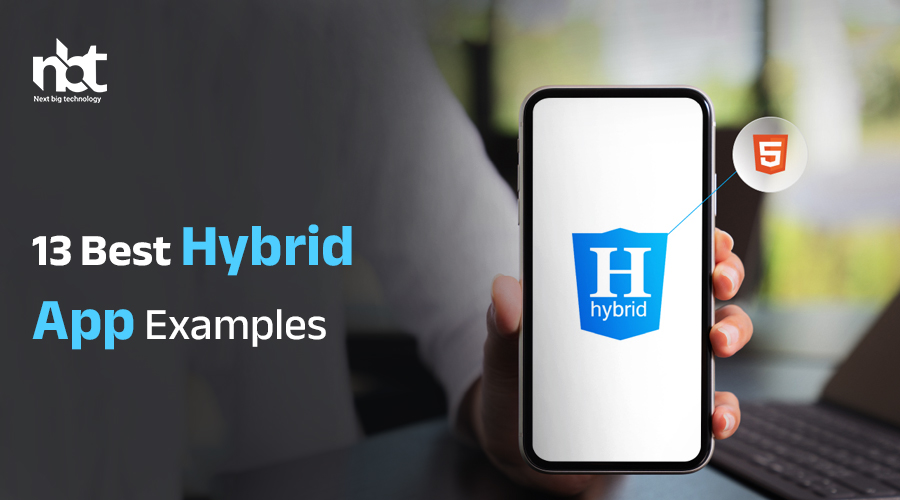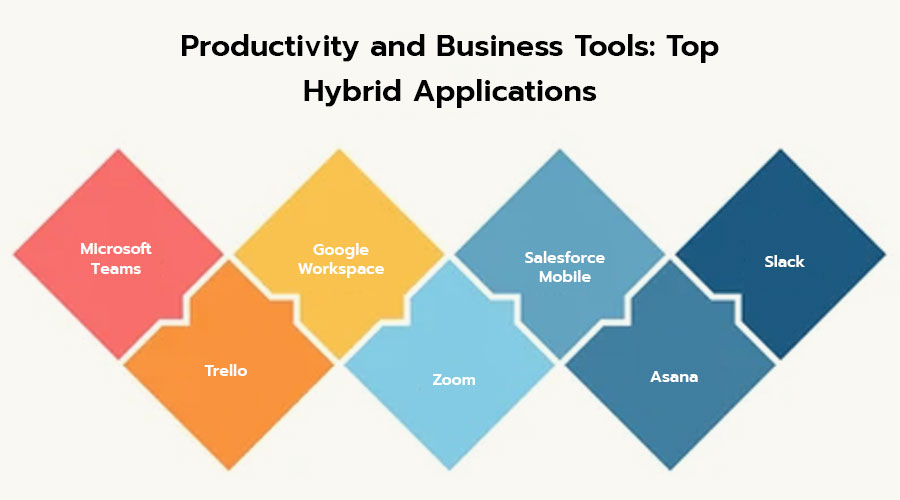Table of Contents
Introduction to Hybrid Apps
In the dynamic landscape of mobile applications, hybrid apps have emerged as a popular choice for developers seeking a balance between native performance and cross-platform compatibility. As businesses increasingly prioritize mobile presence, understanding the fundamentals of hybrid apps becomes crucial. This article aims to demystify hybrid apps, offering insights into their definition, benefits, challenges, and examples of popular frameworks.
What are Hybrid Apps?
Hybrid apps, as the name suggests, combine elements of both native and web applications. They are developed using web technologies like HTML, CSS, and JavaScript, and then wrapped within a native container that allows them to be deployed across multiple platforms. This approach enables developers to write code once and run it on various operating systems, such as iOS, Android, and Windows.
Benefits of Hybrid Apps:
- Cost-Effectiveness: Developing a single hybrid app that works across multiple platforms significantly reduces development costs compared to building separate native apps for each platform.
- Faster Development Time: With a single codebase, developers can expedite the development process, ensuring quicker time-to-market and agility in responding to user feedback and market demands.
- Cross-Platform Compatibility: Hybrid apps ensure a consistent user experience across different devices and operating systems, eliminating the need to develop and maintain separate codebases for each platform.
- Access to Device Features: Unlike pure web apps, hybrid apps can leverage device capabilities such as camera, GPS, and push notifications, enhancing user engagement and functionality.
Challenges of Hybrid Apps:
- Performance Limitations: While hybrid apps strive to achieve native-like performance, they may not match the speed and responsiveness of fully native applications, especially for complex graphics or intensive computations.
- Limited Access to Native Features: Although hybrid apps can access many device features, they may encounter limitations or delays in accessing certain native functionalities, leading to compromises in user experience.
- Dependency on Third-Party Tools: Hybrid app development often relies on third-party frameworks and tools, which may introduce additional complexity, dependencies, and compatibility issues.
Popular Hybrid App Frameworks:
- Ionic: Built on top of AngularJS and Apache Cordova, Ionic offers a comprehensive SDK for hybrid app development, featuring pre-designed UI components, themes, and plugins.
- React Native: Developed by Facebook, React Native allows developers to build hybrid apps using React and JavaScript, offering a native-like user experience and performance.
- Flutter: Developed by Google, Flutter enables the creation of hybrid apps with a single codebase using the Dart programming language, boasting high-performance rendering and customizable UI components.
Understanding Hybrid App Development
In the fast-paced realm of mobile app development, businesses and developers are constantly exploring innovative ways to reach wider audiences without compromising user experience. One such solution gaining traction is hybrid app development. Combining the best of both worlds—native and web technologies—hybrid apps offer a versatile approach to building applications that run seamlessly across multiple platforms.
What is Hybrid App Development?
Hybrid app development involves creating applications using a single codebase that can be deployed across various platforms, including iOS, Android, and even the web. Unlike native apps, which are developed specifically for one platform using languages like Swift or Java, hybrid apps leverage web technologies such as HTML5, CSS, and JavaScript.
The Anatomy of Hybrid Apps
Hybrid apps consist of two main components:
- Native Shell: At the core of hybrid apps lies a native shell, essentially a container that enables the app to access device features like the camera, GPS, and accelerometer. This native layer is responsible for rendering the app’s user interface and executing native code when necessary.
- Web View: Within the native shell, hybrid apps utilize a web view—a full-screen browser instance—to display web content. This is where web technologies come into play, allowing developers to design the app’s interface using familiar web development tools.
Pros and Cons of Hybrid App Development
Pros:
- Cross-Platform Compatibility: Hybrid apps can be deployed across multiple platforms with minimal modifications, reducing development time and costs.
- Cost-Effectiveness: By sharing a single codebase, developers can streamline the development process and maintain consistency across platforms, resulting in lower expenses.
- Faster Development Time: Leveraging web technologies allows for rapid prototyping and iteration, accelerating time-to-market.
- Access to Native Features: Hybrid apps can access device features through plugins or APIs, providing a native-like experience to users.
Cons:
- Performance Limitations: While hybrid apps have made significant strides in performance, they may still lag behind native apps, especially when handling complex animations or graphics-intensive tasks.
- Limited Access to Native APIs: Although plugins exist to bridge the gap, hybrid apps may encounter limitations in accessing certain device functionalities compared to native apps.
- Dependency on Third-Party Frameworks: Hybrid app development often relies on frameworks like Ionic or React Native, which may introduce dependencies and require updates to remain compatible with new platform releases.
Choosing the Right Approach
When deciding between hybrid and native app development, it’s essential to consider factors such as project requirements, budget constraints, and target audience. While hybrid apps offer versatility and cost-effectiveness, native apps excel in performance and provide deeper integration with platform-specific features.
Evaluation Metrics for Hybrid App Performance
In today’s digital age, mobile applications have become an integral part of our lives, catering to various needs from communication to entertainment and productivity. With the surge in demand for mobile apps, developers are presented with a myriad of choices in terms of development approaches. One such approach that has gained significant traction is hybrid app development.
Hybrid apps offer a compelling solution by combining the best of both worlds: the flexibility of web technologies and the performance of native apps. However, ensuring optimal performance remains a critical concern for developers venturing into hybrid app development. To gauge and optimize the performance of hybrid apps effectively, it’s essential to understand and employ appropriate evaluation metrics. Let’s delve into some key metrics that play a pivotal role in assessing hybrid app performance:
- Load Time: The time taken for an app to load and become functional is a crucial performance indicator. Users expect swift responsiveness, and any delay in loading can lead to frustration and abandonment. Monitoring load time helps in identifying bottlenecks and optimizing resource utilization.
- Responsiveness: Responsiveness measures the app’s ability to promptly respond to user interactions such as taps, swipes, and input gestures. A laggy or unresponsive interface can degrade the user experience significantly. By assessing responsiveness, developers can fine-tune code efficiency and improve user interaction.
- Memory Usage: Hybrid apps operate within a constrained environment, often sharing resources with other applications. Monitoring memory usage is vital to prevent excessive consumption, which can lead to sluggish performance, crashes, or even device overheating. Optimizing memory usage enhances app stability and overall performance.
- Battery Consumption: Mobile device battery life is a precious commodity, and inefficient apps can drain it rapidly, leading to user dissatisfaction. Evaluating battery consumption helps in identifying power-hungry components or processes within the app. Developers can then optimize code and minimize background activity to conserve battery life.
- Network Performance: Hybrid apps rely on network connectivity for fetching data and content, making network performance a critical factor. Metrics such as latency, throughput, and error rates provide insights into network efficiency and reliability. Optimizing network requests, caching strategies, and minimizing unnecessary data transfers can enhance overall app performance, especially in varying network conditions.
- Rendering Performance: Smooth and fluid rendering is paramount for delivering a visually appealing user experience. Rendering performance metrics include frame rate, frame drops, and rendering time. By optimizing rendering pipelines, leveraging hardware acceleration, and adopting efficient UI rendering practices, developers can ensure silky-smooth animations and transitions.
- Crash Rate: App stability is paramount for retaining users and fostering trust. Monitoring crash rates helps in identifying and rectifying software bugs, memory leaks, and compatibility issues across different devices and OS versions. Employing robust error tracking mechanisms and frequent testing can mitigate crashes and enhance app reliability.
- Security: While not traditionally considered a performance metric, security directly impacts app performance by influencing data processing overhead and network latency. Ensuring robust encryption, secure data transmission, and stringent access controls are essential for safeguarding user data and maintaining trust.
Financial and Market Success of Hybrid Apps
In the dynamic landscape of mobile app development, hybrid apps have emerged as a game-changer, revolutionizing both the technological sphere and the financial markets. Combining the best of both worlds – native and web applications – hybrid apps offer a myriad of benefits, propelling businesses towards unprecedented success. Let’s delve into the financial and market triumphs attributed to the ascendancy of hybrid apps.
Understanding Hybrid Apps
Hybrid apps amalgamate elements of native apps, developed for specific platforms like iOS or Android, with web apps, crafted using web technologies like HTML, CSS, and JavaScript. Utilizing frameworks such as Ionic, React Native, or Flutter, developers can build apps that operate seamlessly across multiple platforms while leveraging device capabilities.
Cost Efficiency and Rapid Development
One of the primary drivers behind the proliferation of hybrid apps is their cost efficiency. Unlike native app development, which requires separate coding for each platform, hybrid apps enable developers to write code once and deploy it across various platforms, significantly reducing development costs and time-to-market.
Market Penetration and Reach
The versatility of hybrid apps empowers businesses to reach a broader audience base. By catering to both iOS and Android users with a single codebase, companies can penetrate diverse markets without the need for separate development efforts. This expanded reach translates into increased user engagement and revenue potential.
Enhanced User Experience
Contrary to misconceptions, hybrid apps offer a seamless user experience akin to native applications. With advancements in hybrid frameworks and technologies, developers can leverage native-like features and functionalities, ensuring optimal performance and user satisfaction. Moreover, hybrid apps facilitate real-time updates, ensuring users have access to the latest features without cumbersome manual updates.
Monetization Opportunities
From a financial standpoint, hybrid apps present lucrative monetization avenues for businesses. Whether through in-app purchases, subscription models, or advertising, companies can capitalize on their app’s widespread adoption to generate substantial revenue streams. Additionally, hybrid apps facilitate seamless integration with third-party services and APIs, further augmenting monetization prospects.
Agile Adaptation to Market Trends
In the fast-paced realm of mobile technology, staying abreast of market trends is paramount for sustained success. Hybrid apps offer unparalleled flexibility, allowing businesses to swiftly adapt to evolving market demands and consumer preferences. Through seamless updates and iterative improvements, companies can maintain their competitive edge and capitalize on emerging opportunities.
Case Studies: Financial Triumphs with Hybrid Apps
Numerous success stories underscore the financial prowess of hybrid apps across diverse industries. For instance, Airbnb leveraged React Native to streamline its app development process, resulting in enhanced user engagement and a significant reduction in development costs. Similarly, the Starbucks app, built with Flutter, witnessed a surge in performance and customer satisfaction, driving substantial revenue growth.
Hybrid Apps in E-commerce: Success Stories
In the dynamic realm of e-commerce, the competition is fierce, and staying ahead demands innovation. Amidst this landscape, hybrid apps have emerged as a game-changer, blending the best of both native and web applications. With their versatility and efficiency, hybrid apps have paved the way for remarkable success stories in the e-commerce sector.
The Rise of Hybrid Apps in E-commerce
Hybrid apps have gained traction due to their ability to combine the accessibility of web apps with the performance and features of native apps. Leveraging technologies like HTML5, CSS, and JavaScript, these apps offer a seamless user experience across multiple platforms, including iOS and Android.
Success Stories Redefining E-commerce
1. Walmart
Walmart, the retail giant, embraced hybrid app technology to enhance its e-commerce presence. By developing a hybrid app, Walmart ensured a consistent user experience across various devices. The app’s responsiveness and intuitive interface have contributed to increased customer engagement and sales.
2. Amazon
Amazon, the global e-commerce powerhouse, recognized the potential of hybrid apps early on. By leveraging hybrid app development, Amazon streamlined its mobile shopping experience, offering customers a feature-rich interface coupled with smooth performance. This approach has significantly boosted Amazon’s mobile revenue and customer retention rates.
3. Etsy
Etsy, a leading online marketplace for handmade and vintage goods, turned to hybrid apps to expand its reach. By investing in hybrid app development, Etsy provided users with a seamless shopping experience, complete with real-time updates and personalized recommendations. The app’s success underscores the effectiveness of hybrid technology in driving e-commerce growth.
Key Benefits of Hybrid Apps in E-commerce
- Cost-Effectiveness: Hybrid apps offer cost savings compared to developing separate native apps for each platform.
- Faster Development: With a single codebase, hybrid apps can be developed and deployed faster than native apps.
- Cross-Platform Compatibility: Hybrid apps ensure consistent performance across various platforms, reaching a broader audience.
- Offline Functionality: Hybrid apps can function offline, enabling users to browse products and make purchases even without an internet connection.
- Enhanced User Experience: By combining native-like functionality with web technologies, hybrid apps deliver a seamless and engaging user experience.
Gaming Hybrid Apps: Innovation and Impact
In recent years, the landscape of gaming has witnessed a transformative shift, largely propelled by the emergence of hybrid apps. These versatile platforms, blending the best of both web and native applications, have revolutionized the way gamers interact with their favorite titles. From augmented reality adventures to seamless cross-platform experiences, the innovation and impact of gaming hybrid apps are reshaping the industry in profound ways.
Embracing Versatility: The Essence of Hybrid Apps
Gaming hybrid apps represent a fusion of web technologies like HTML5, CSS, and JavaScript with native functionalities. This amalgamation allows developers to create applications that run smoothly across multiple platforms, including iOS, Android, and desktops. By harnessing the power of frameworks like React Native, Xamarin, or Ionic, developers can deliver immersive gaming experiences without sacrificing performance or accessibility.
Breaking Down Barriers: Cross-Platform Compatibility
One of the most significant advantages of gaming hybrid apps is their ability to transcend platform limitations. Unlike traditional native apps, which are often confined to specific operating systems, hybrid counterparts offer seamless cross-platform compatibility. Whether you’re gaming on a smartphone, tablet, or PC, the experience remains consistent, fostering a more inclusive gaming community.
Pioneering Innovation: Augmented Reality and Beyond
The realm of gaming hybrid apps has become a hotbed for innovation, particularly in the realm of augmented reality (AR) gaming. Titles like Pokémon GO have captivated millions of players worldwide, blurring the lines between the virtual and physical realms. By leveraging a device’s camera and GPS capabilities, AR hybrid apps transport gamers into interactive worlds where fantasy and reality collide, creating unparalleled immersive experiences.
Driving Accessibility: Reach and Engagement
Beyond their technical prowess, gaming hybrid apps play a pivotal role in driving accessibility and engagement. With simplified deployment processes and broader reach across various platforms, developers can tap into larger audiences and communities. This accessibility not only enhances user engagement but also fosters a more diverse and inclusive gaming ecosystem.
Overcoming Challenges: Performance and Optimization
While the benefits of gaming hybrid apps are undeniable, they are not without their challenges. Performance optimization remains a critical concern, as developers strive to deliver seamless experiences across diverse hardware configurations. By employing efficient coding practices and leveraging the latest advancements in web technologies, however, developers can overcome these hurdles and unlock the full potential of hybrid gaming experiences.
The Future of Gaming: An Evolving Landscape
As technology continues to evolve, so too will the landscape of gaming hybrid apps. From advancements in augmented reality to the integration of artificial intelligence and machine learning, the possibilities are endless. By embracing innovation and pushing the boundaries of what’s possible, developers will shape the future of gaming, ushering in an era of unparalleled immersion, accessibility, and excitement.
Hybrid Apps in Healthcare: Transforming the Industry
In the contemporary landscape of healthcare, technological advancements continue to redefine the way medical services are delivered and accessed. One such innovation that stands out prominently is the emergence of hybrid apps, presenting a revolutionary shift in how healthcare is administered. Combining the strengths of both native and web applications, hybrid apps offer a versatile platform that is poised to transform the industry in unprecedented ways.
Embracing Hybrid Technology in Healthcare: Hybrid apps integrate the best features of native and web applications, offering a seamless user experience across multiple platforms. In the healthcare sector, where accessibility and efficiency are paramount, this versatility holds immense potential. Whether it’s facilitating communication between patients and healthcare providers, streamlining administrative tasks, or delivering personalized care solutions, hybrid apps are reshaping the healthcare landscape.
Enhanced Accessibility and Patient Engagement: One of the primary advantages of hybrid apps in healthcare is their ability to enhance accessibility and patient engagement. By offering cross-platform compatibility, these apps ensure that patients can access vital healthcare services anytime, anywhere, regardless of the device they use. This accessibility fosters greater patient engagement, allowing individuals to take a more proactive role in managing their health.
Seamless Integration with Existing Systems: Hybrid apps offer seamless integration with existing healthcare systems, making them an ideal choice for healthcare providers looking to enhance their digital infrastructure. Whether it’s integrating Electronic Health Records (EHR) systems, remote monitoring devices, or patient portals, hybrid apps can streamline operations and improve overall efficiency within healthcare organizations.
Personalized Care Solutions: Personalization lies at the heart of modern healthcare, and hybrid apps excel in delivering personalized care solutions tailored to individual patient needs. Through features such as real-time data analysis, predictive analytics, and AI-driven insights, these apps empower healthcare providers to deliver targeted interventions and personalized treatment plans, leading to better patient outcomes.
Security and Compliance: In the healthcare industry, data security and compliance with regulatory standards are non-negotiable. Hybrid apps prioritize security by implementing robust encryption protocols and stringent data protection measures. Moreover, they ensure compliance with regulations such as HIPAA (Health Insurance Portability and Accountability Act), safeguarding patient confidentiality and maintaining the integrity of sensitive medical information.
Future Prospects and Challenges: As hybrid apps continue to gain traction in the healthcare sector, the future looks promising. However, challenges such as interoperability, scalability, and maintaining user trust remain areas of concern. Addressing these challenges will require ongoing collaboration between healthcare stakeholders, technology providers, and regulatory bodies to ensure that hybrid apps fulfill their potential in transforming the industry.
Entertainment and Media: Noteworthy Hybrid Solutions
In the ever-evolving landscape of entertainment and media, the emergence of hybrid solutions stands out as a beacon of innovation. Blending traditional formats with cutting-edge technology, these solutions redefine how we consume and interact with content. From immersive experiences to interactive storytelling, the possibilities are limitless. Let’s delve into some of the most notable hybrid solutions shaping the future of entertainment and media.
1. Augmented Reality (AR) in Live Events: Augmented Reality has transformed live events into captivating experiences by overlaying digital content onto the real world. From concerts to sports matches, AR enhances audience engagement and immersion. Imagine attending a music festival where holographic performers interact with the crowd, or watching a football game with real-time stats and replays projected onto the field. AR bridges the gap between physical and digital realms, creating unforgettable moments for spectators.
2. Interactive Streaming Platforms: Streaming platforms have revolutionized how we consume media, but the next frontier lies in interactivity. Interactive streaming allows viewers to shape the narrative through their choices, akin to a choose-your-own-adventure story. This dynamic approach to storytelling empowers users to explore multiple plotlines and endings, fostering deeper engagement and replay value. Whether it’s a suspenseful thriller or a lighthearted comedy, interactive streaming puts the audience in the director’s chair.
3. Virtual Production Studios: Virtual production has democratized filmmaking by bringing together the best of physical and digital production techniques. Utilizing advanced CGI and real-time rendering, virtual studios create immersive environments that rival traditional sets. Directors can visualize scenes in real-time, experiment with lighting and camera angles, and make instant adjustments, streamlining the production process. From epic blockbusters to intimate dramas, virtual production unlocks limitless creative possibilities for filmmakers.
4. Blockchain-Powered Content Distribution: Blockchain technology is disrupting traditional models of content distribution, offering transparency, security, and fair compensation for creators. Through decentralized platforms, artists can directly monetize their work and maintain ownership rights without intermediaries. Smart contracts ensure that royalties are distributed accurately and efficiently, fostering a more equitable ecosystem for content creators. By harnessing the power of blockchain, entertainment and media industries are ushering in a new era of transparency and empowerment.
5. Mixed Reality Gaming: Mixed Reality blurs the line between the physical and virtual worlds, creating immersive gaming experiences that transcend reality. Combining elements of Virtual Reality (VR) and Augmented Reality (AR), mixed reality games merge digital gameplay with real-world environments. Whether it’s battling virtual monsters in your backyard or solving puzzles in augmented landscapes, mixed reality gaming transports players to fantastical realms where imagination knows no bounds.
Productivity and Business Tools: Top Hybrid Applications
In the dynamic landscape of business, staying ahead requires more than just hard work; it demands smart work. Leveraging the right tools can significantly amplify productivity, streamline operations, and drive growth. Hybrid applications, blending the best of web-based and native applications, have emerged as game-changers in the realm of productivity and business management. Let’s delve into the top hybrid applications that are reshaping the way businesses operate.
- Microsoft Teams: As remote work becomes the new norm, efficient communication and collaboration tools are paramount. Microsoft Teams stands out as a hybrid application that seamlessly integrates chat, video conferencing, file sharing, and app integration. Whether your team is in the office or spread across the globe, Teams fosters collaboration and enhances productivity.
- Google Workspace (formerly G Suite): Google Workspace offers a suite of productivity tools including Gmail, Google Drive, Google Docs, Sheets, and Slides. Its hybrid nature allows users to access these applications both online and offline, ensuring uninterrupted workflow. With real-time collaboration features and robust security measures, Google Workspace empowers teams to work smarter and faster.
- Salesforce Mobile: For businesses focused on sales and customer relationship management (CRM), Salesforce Mobile is indispensable. This hybrid application provides on-the-go access to critical sales data, customer information, and analytics. Whether you’re closing deals or nurturing leads, Salesforce Mobile enables sales teams to be agile and responsive, driving revenue growth.
- Slack: Renowned for its intuitive interface and powerful features, Slack revolutionizes team communication. By combining real-time messaging, file sharing, and app integration, Slack keeps teams connected and productive. Its hybrid capabilities ensure seamless synchronization across devices, empowering teams to collaborate effectively from anywhere.
- Trello: When it comes to project management, Trello reigns supreme. This hybrid application offers a visual and customizable approach to organizing tasks, projects, and workflows. With features like boards, lists, and cards, Trello facilitates collaboration and transparency within teams. Whether you’re managing a small team or a large-scale project, Trello adapts to your workflow seamlessly.
- Zoom: As virtual meetings become ubiquitous, Zoom emerges as a go-to platform for video conferencing and webinars. With its hybrid application, users can join meetings from their desktop, mobile devices, or even through a web browser. Zoom’s high-quality video and audio, along with interactive features like screen sharing and virtual backgrounds, enhance communication and collaboration.
- Asana: Streamlining task management and project coordination, Asana empowers teams to organize, track, and manage work effectively. Its hybrid application offers flexibility and accessibility, allowing users to stay productive whether online or offline. With features like task assignments, deadlines, and progress tracking, Asana enables teams to achieve their goals efficiently.
Top Best Hybrid App Development Companies
In today’s digital landscape, the demand for innovative mobile applications is soaring higher than ever before. With the proliferation of smartphones and tablets, businesses are constantly seeking ways to engage their audience through intuitive and feature-rich mobile experiences. Hybrid app development has emerged as a preferred choice for companies looking to reach a wide range of users across multiple platforms efficiently.
If you’re in the market for top-notch hybrid app development services, you’re in luck! We’ve curated a list of the crème de la crème of hybrid app development companies that are paving the way for cutting-edge mobile solutions in 2024.
-
-
Next Big Technology:

Focus Area
- Mobile App Development
- App Designing (UI/UX)
- Software Development
- Web Development
- AR & VR Development
- Big Data & BI
- Cloud Computing Services
- DevOps
- E-commerce Development
Industries Focus
- Art, Entertainment & Music
- Business Services
- Consumer Products
- Designing
- Education
- Financial & Payments
- Gaming
- Government
- Healthcare & Medical
- Hospitality
- Information Technology
- Legal & Compliance
- Manufacturing
- Media
-
- Appify: Appify is synonymous with excellence in hybrid app development. Their proven track record of delivering high-quality applications for both startups and enterprises speaks volumes about their proficiency in the field. From concept to execution, Appify ensures that every project is executed with precision and finesse.
- TechGenius: With a focus on pushing the boundaries of hybrid app development, TechGenius is a force to be reckoned with in the industry. Their comprehensive approach, coupled with a deep understanding of user experience design, enables them to deliver solutions that not only meet but exceed client expectations.
- CodeCrafters: As pioneers in hybrid app development, CodeCrafters combines technical prowess with creative flair to deliver exceptional mobile experiences. Their collaborative approach ensures that clients are actively involved throughout the development process, resulting in solutions that are perfectly aligned with their vision.
- InnoApps: InnoApps prides itself on its ability to transform ideas into reality through innovative hybrid app development. With a focus on scalability and performance, they empower businesses to stay ahead of the curve in today’s competitive market landscape.
- TechInnovate: True to its name, TechInnovate is at the forefront of technological innovation in hybrid app development. Their team of experts leverages the latest tools and frameworks to create robust and feature-rich applications that resonate with users.
- AppCrafters: With a passion for crafting exceptional hybrid applications, AppCrafters goes above and beyond to deliver solutions that make a lasting impression. Their dedication to excellence and attention to detail set them apart as a trusted partner for businesses looking to elevate their mobile presence.
- HybridSolutions Inc.: Specializing in hybrid app development, HybridSolutions Inc. brings together the best of both worlds to create dynamic and engaging mobile experiences. Their holistic approach ensures that every aspect of the development process is meticulously executed to deliver unparalleled results.
- DevInnovate: DevInnovate is synonymous with innovation and excellence in hybrid app development. With a focus on driving business growth through transformative mobile solutions, they empower clients to stay ahead of the competition in today’s fast-paced digital landscape.
- AppForge: Rounding off our list is AppForge, a leading hybrid app development company known for its commitment to quality and customer satisfaction. With a diverse portfolio of successful projects under their belt, they continue to set the benchmark for excellence in the industry.
FAQs On Hybrid App Development
In today’s fast-paced digital world, businesses are constantly seeking innovative ways to reach their target audience effectively. One such solution that has gained significant traction is hybrid app development. Combining the best of both native and web applications, hybrid apps offer versatility, cost-effectiveness, and cross-platform compatibility. However, as with any emerging technology, there are bound to be questions. Let’s delve into some frequently asked questions (FAQs) about hybrid app development to shed light on this evolving landscape.
1. What exactly is a hybrid app?
A hybrid app is a blend of web and native applications. It’s built using web technologies like HTML, CSS, and JavaScript, then wrapped in a native container, allowing it to be installed and run like a native app on various platforms.
2. How does hybrid app development differ from native development?
While native apps are developed specifically for one platform, such as iOS or Android, hybrid apps are cross-platform, meaning they can run on multiple operating systems with minimal modifications. This significantly reduces development time and costs associated with maintaining separate codebases for each platform.
3. What are the advantages of hybrid app development?
Hybrid apps offer several advantages, including:
- Cost-effectiveness: Developing a single hybrid app that works across multiple platforms is more cost-effective than building separate native apps.
- Faster time-to-market: With hybrid development, you can reach a wider audience in less time since you’re not starting from scratch for each platform.
- Ease of maintenance: Updates and changes can be implemented once and deployed across all platforms simultaneously, simplifying the maintenance process.
- Access to device features: Hybrid apps can access device features like camera, GPS, and push notifications, similar to native apps.
4. Are hybrid apps as performant as native apps?
While hybrid apps may not always match the performance of native apps, advancements in hybrid app frameworks like React Native and Flutter have narrowed the performance gap considerably. For most applications, the difference in performance is negligible, especially considering the benefits of cross-platform compatibility and cost-effectiveness.
5. Can hybrid apps access device hardware features?
Yes, hybrid apps can access device hardware features through plugins or APIs provided by the hybrid app development frameworks. This allows developers to integrate functionalities like GPS, camera, accelerometer, and more into their hybrid applications seamlessly.
6. Are there any limitations to hybrid app development?
While hybrid app development offers numerous advantages, it’s essential to consider potential limitations such as:
- Limited access to native APIs: Some advanced device features may not be readily accessible through hybrid development, requiring custom plugins or native code integration.
- Performance considerations: While performance has improved significantly, highly complex or graphics-intensive applications may still benefit from native development.
- Platform-specific nuances: Despite cross-platform compatibility, there may be slight differences in user experience and behavior across different operating systems that require attention during development.
7. How do I choose between hybrid and native app development for my project?
The choice between hybrid and native app development depends on various factors such as project requirements, budget, timeline, target audience, and desired features. Consulting with experienced app developers and weighing the pros and cons of each approach can help you make an informed decision based on your specific needs and goals.
Thanks for reading our post “13 Best Hybrid App Examples”. Please connect with us to learn more about Best Top Hybrid App.






















